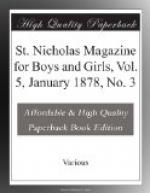“No horse, no boy back there?” pointing to the road just traversed by Mr. Devins.
“No. I have looked carefully, and if there had been a trace left by the recent storm I should have detected it.”
“Ugh! well, me come over the hill; nothing that way either; then they here.”
“Why do you think so?”
“Ah! me know wolves. When Allan come to this place they ahead; horse turn; wolves caught ’em this side woods; we look there,” and Tayenathonto pointed to the very course taken by the horse and rider.
It so happened when Allan was thrown from the horse’s back that his rifle flew from his hand and struck, muzzle down, in a hollow stump, where, imbedded in the snow, it stood like a sign to mark the scene of the last struggle of the lost boy. The snow had whitened all its hither side. When the Indian came abreast of it, he cried:
“Told you so! See! Allan’s gun! And here rest of ’em,” pointing to the little heap over the ruins of the old cabin.
Kicking the snow hastily aside, the Indian examined the ground carefully a moment and then said: “No, only horse; Allan further on.”
The Indian, with head bent down, walked quickly forward, threw up his arms, and disappeared. He had stepped over the clean edge of the cellar and sunk exactly as Allan had. A few desperate plunges sufficed to take the strong Indian through the intervening snow and into the protected corner where Allan, just rousing from his second sleep, sat bolt upright. The Indian’s coming disturbed the snow so that a glimmer of light penetrated into the dark space. Allan supposed a wolf had found its way down there, and hastily drew his large knife, bracing himself for an encounter.
The Indian sputtered, thrashed about to clear himself from the snow, and in so doing rapped his head smartly against the low ceiling of logs.
“Waugh! waugh!” exclaimed he. “Too much low; Indian break ’em head; look out.”
Allan instantly recognized the voice of the Indian, his comrade on many a fishing and hunting tour.
“Tayenathonto!” he cried, “dear old fellow, who would have thought of you finding me!”
The Indian quietly replied:
“Tayenathonto no find; come like water-fall; couldn’t help his self.”
A very few minutes sufficed to put both on the surface again, where Allan was received “like one come from the dead,” and closely folded in his father’s arms. Oh, the joy of that embrace! The past grief and suffering were forgotten in the bliss of that moment.
The Indian had to return with the happy father and son to their home, where he was hailed as Allan’s rescuer, and enjoyed to the full a share of the festivities.
In after years Allan married Esther Inman, and now, by the fireside in winter, he tells his grandchildren of his escape from the wolves, and the little ones never tire of petting their faithful old Tayenathonto.




